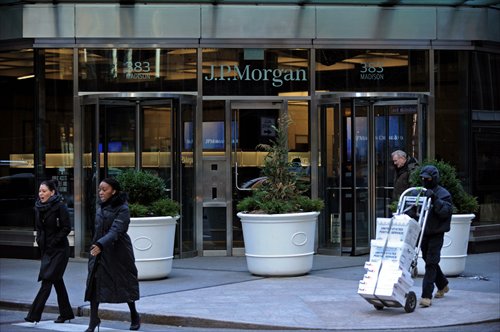SOURCE / MARKETS
US securities firm JPMorgan one step closer to becoming first wholly foreign-owned securities firm in China

Pedestrians, including a US postal worker (right), pass by JPMorgan Chase & Co offices in New York, US. Photo: CFP
US securities firm JPMorgan is one step closer to becoming the first wholly foreign-owned securities firm in China as the country increases efforts to open up its financial markets.
The company acquired an extra 20 percent share in its joint venture (JV) in China, JPMorgan Securities (China) Company from the JV's second-largest stakeholder, Shanghai Waigaoqiao Free Zone Group Co in October, according to information released by the Shanghai United Asset and Equity Exchange.
The share transfer was successfully completed at the base price of 178 million yuan ($26.59 million). After the deal, JPMorgan now holds a 71 percent share of the JV, which could make it the first securities firm in China that is wholly owned by a foreign company.
In March 2019, China's securities regulators approved the set-up of JPMorgan Securities (China) Company, making it among the first batch of foreign-owned security firms in China. In 2018, the country eased the 50-percent share limit on foreign companies in some financial sectors.
JPMorgan owned 51 percent of the JV that time, while Shanghai Waigaoqiao held 20 percent. The remaining 29 percent was held by other stakeholders, including Zhuhai MLD Fund Management Company, and Beijing Langxin Invest Co.
China scrapped the shareholding limit on foreign securities on April 1 this year, meaning foreign companies could hold up to a 100 percent share in China's securities market.
As the remaining minority stakeholders are mostly financial investors, industry observers predict that the US company will attempt to purchase the remaining shares.
In recent months, JPMorgan has also expanded its footprint in other financial markets in China. In June, the company got the nod from China to have the first fully foreign-owned futures business too.
Global Times
